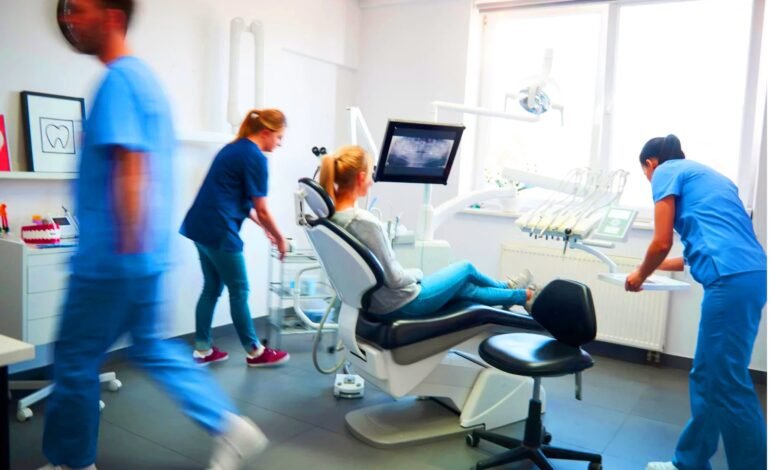Dental Health Care in Germany: Access and Quality

Germany is renowned for its comprehensive healthcare system, which extends to dental care, ensuring that residents have access to high-quality services. The German healthcare system operates under a dual public-private insurance model, with dental care included in both. In this article, we delve into the accessibility and quality of dental healthcare services in Germany, exploring the factors that influence patient experience, treatment options, and preventive measures. From understanding the structure of the German healthcare system to examining the standards of dental care and patient satisfaction, we aim to provide a detailed overview of dental healthcare in Germany.
Understanding the German Healthcare System
Public vs. Private Insurance
In Germany, healthcare is primarily funded through statutory health insurance (SHI), which covers around 90% of the population. Individuals earning above a certain threshold can opt for private health insurance (PHI). Both SHI and PHI cover dental care to varying extents.
Inclusion of Dental Care
Dental care is considered an essential part of healthcare in Germany. Basic dental services such as check-ups, fillings, and simple extractions are covered by statutory health insurance. However, more complex procedures like crowns, bridges, and orthodontic treatments often require additional private insurance or out-of-pocket payments.
Patient Co-payments and Out-of-Pocket Costs
Patients covered by statutory health insurance typically pay a portion of the cost of dental treatments out of pocket. These co-payments vary depending on the type of treatment and the individual’s insurance plan. Private insurance may cover a larger portion of dental expenses, but premiums tend to be higher.
Access to Dental Health Care
Availability of Dentists
Germany boasts a high density of dentists per capita, particularly in urban areas. Finding a dentist is generally not difficult, with a wide range of practices offering services in both public and private settings. However, there may be shortages of dentists in rural and remote regions.
Waiting Times for Appointments
In urban centers, patients can typically secure dental appointments within a reasonable timeframe. However, waiting times may be longer for specialized treatments or in areas with fewer dentists. Emergency dental services are available for urgent cases, ensuring prompt care when needed.
Quality of Dental Care
Standards and Regulations
Dental practices in Germany are subject to strict regulations and quality standards set by professional bodies and government agencies. Dentists must undergo rigorous training and adhere to guidelines to maintain high standards of care and patient safety.
Use of Technology
German dental practices are equipped with modern technology and equipment to ensure accurate diagnosis and effective treatments. From digital imaging systems to computer-aided design and manufacturing (CAD/CAM) technology for dental restorations, advanced tools contribute to the delivery of high-quality care.
Continuity of Care
Continuity of care is emphasized in the German dental system, with dentists focusing on long-term oral health management for their patients. Regular check-ups and preventive measures are key components of maintaining oral health and addressing issues before they escalate.
Preventive Measures
Education and Awareness Programs
German healthcare providers prioritize patient education and awareness regarding oral hygiene and preventive measures. Public health campaigns promote proper brushing and flossing techniques, regular dental check-ups, and the importance of a balanced diet for dental health.
Fluoridation
Fluoridation of drinking water is widespread in Germany, contributing to improved dental health by strengthening tooth enamel and reducing the risk of cavities. This preventive measure is supported by scientific evidence and endorsed by dental professionals.
Regular Check-ups
Regular dental check-ups are recommended for individuals of all ages to detect and prevent oral health issues. German health insurance covers routine check-ups and cleanings, encouraging patients to prioritize preventive care to maintain their oral health.
Specialized Dental Services
Orthodontics
Orthodontic treatments, including braces and aligners, are available in Germany for individuals requiring corrective measures for misaligned teeth or bite issues. Orthodontists specialize in diagnosing and treating such conditions to improve dental health and aesthetics.
Endodontics
Endodontic procedures, such as root canal therapy, are performed by specialized dentists known as endodontists. These professionals focus on treating issues affecting the inner tissues of the teeth, preserving natural teeth whenever possible through advanced techniques.
Implantology
Implantology is a specialized field of dentistry focused on replacing missing teeth with dental implants. German dentists offer comprehensive implant services, including implant placement and restoration, to restore functionality and aesthetics for patients with missing teeth.
Costs and Affordability
Cost of Common Procedures
The cost of dental procedures in Germany varies depending on the complexity of the treatment and whether it is covered by health insurance. Basic procedures like fillings and cleanings are relatively affordable, while more extensive treatments may incur higher out-of-pocket expenses.
Reimbursement and Insurance Coverage
Statutory health insurance covers basic dental treatments, but patients may need to pay co-payments for certain services. Private insurance plans offer more comprehensive coverage for dental care, including elective procedures and specialized treatments, with varying levels of reimbursement.
Financial Assistance Programs
For individuals facing financial hardship, there are government-sponsored financial assistance programs and subsidies available to help cover the cost of necessary dental treatments. These programs aim to ensure that all residents have access to essential dental care regardless of their financial situation.
Read More: Healthcare Innovations: Exploring Germany’s Medical Landscape
Patient Experience and Satisfaction
Communication with Dentists
German dentists prioritize effective communication with their patients, explaining treatment options, discussing costs, and addressing any concerns or questions. This transparent approach fosters trust and ensures that patients are actively involved in their dental care decisions.
Comfort and Cleanliness
Dental practices in Germany maintain high standards of cleanliness and hygiene, providing a comfortable and safe environment for patients. From waiting areas to treatment rooms, cleanliness, and infection control protocols are strictly followed to uphold patient safety and satisfaction.
Overall Satisfaction Levels
Overall, patient satisfaction with dental care in Germany is high, reflecting the country’s commitment to quality and accessibility. Patients appreciate the professionalism of German dentists, the modern facilities, and the emphasis on preventive care to maintain optimal oral health.
Challenges and Improvements
Shortage of Dentists in Rural Areas
One of the challenges facing the German dental system is the uneven distribution of dentists, with shortages more pronounced in rural and remote areas. Efforts are underway to incentivize dentists to practice in underserved regions and improve access to care for residents in these areas.
Language Barriers
Language barriers can pose challenges for patients from non-German-speaking backgrounds in accessing dental care. To address this issue, some dental practices offer multilingual staff or interpretation services to ensure effective communication and understanding between patients and providers.
Integration of New Technologies
While German dental practices embrace modern technologies, there is a need for ongoing integration and adoption of innovative solutions to enhance patient care and treatment outcomes. Continued investment in research and development is essential to stay abreast of advancements in dental technology.
Government Initiatives and Policies
Dental Health Campaigns
The German government conducts public health campaigns to promote oral hygiene and preventive dental care practices among the population. These campaigns raise awareness about the importance of maintaining good oral health habits and seeking regular dental check-ups.
Incentives for Dentists
To address workforce shortages and encourage dentists to practice in underserved areas, the government offers financial incentives and support programs. These initiatives aim to attract and retain dentists in regions where access to dental care is limited, ensuring equitable distribution of dental services.
Regulatory Reforms
Regulatory reforms are periodically implemented to enhance the quality and efficiency of dental care in Germany. Updates to regulations governing dental practices, professional standards, and reimbursement policies aim to improve patient outcomes and streamline the delivery of dental services.
Read More: Healthcare Financing Models: Public vs. Private in Germany
Conclusion
Access to dental health care in Germany is characterized by a well-established system that prioritizes quality, affordability, and patient-centered care. The combination of public and private insurance options, stringent quality standards, and preventive measures contributes to maintaining optimal oral health for residents across the country.
FAQs
Is dental care covered by health insurance in Germany?
Yes, dental care is partially covered by statutory health insurance in Germany. However, patients often need to pay out-of-pocket for certain treatments and services.
Are there long waiting times to see a dentist in Germany?
Waiting times vary depending on the region and the urgency of the dental issue. In general, access to dental care is relatively good in urban areas compared to rural regions.
What are the common preventive measures recommended by dentists in Germany?
Dentists in Germany emphasize regular check-ups, proper oral hygiene practices, and the use of fluoride to prevent dental issues such as cavities and gum disease.
Can I receive specialized dental services in Germany?
Yes, Germany offers a wide range of specialized dental services, including orthodontics, endodontics, and implantology, provided by qualified professionals.
How does the German government support dental health initiatives?
The German government implements various campaigns and policies to promote dental health, including education programs, incentives for dentists, and regulatory reforms.











